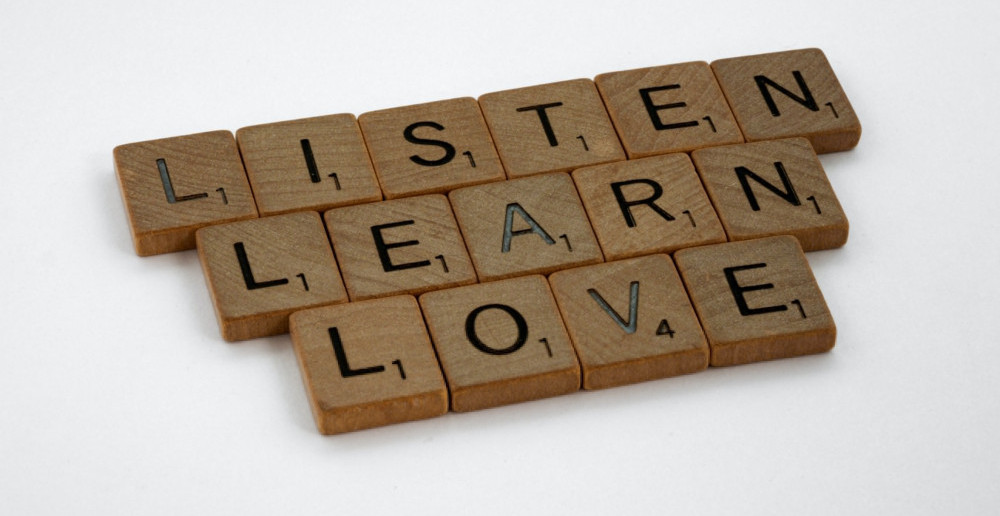“Listening Skills Improvement Tips | Here Are 5 Effective Ways” emphasizes the importance of actively listening to others. It’s an art that takes time to learn.
Humans tend to be egotistic. And, their primary concerns are about “me, myself, and I.” As such, when we listen to others what’s foremost in our minds is, “How can I tell MY story?”
However, it’s more important to think of the other person’s needs and try to understand what they are saying. In that way you will be in a better position to show empathy if that’s the goal.
On the other hand, if the goal is to share your stories mutually you will have a great start to a reciprocal relationship. Think about the importance of that in any kind of relationship whether it’s personal or professional.

Listening Skill | Pay Attention to the Other Person.
Eliminate any distraction that would interfere with your paying attention to the other person. In other words, give them your undivided attention just as you would want them to do for your.
One way to do this is to make eye contact and show genuine interest in what they are saying. This will improve your personal and professional relationships.
Many people go through life simply tolerating those they have to deal with in a close setting. What a difference it would make if they paid closer attention to the things that matter most to each other.
Personal relationships between spouses, parents and children, other family members and friends will benefit from this skill. Likewise, business associates on any level.
Think about the misunderstandings that could have been avoided in professional settings. For example, one business partner has one concept of how the business will be run while another has a totally different concept.
They didn’t end up on the same page despite the many discussions and paperwork involved. This is due to the fact they didn’t actively engage in paying close attention to each other.

Level 1 | Practice Active Listening
There are several levels of listening. And a level one listening skill takes patience, discipline, and a genuine concern for others. It doesn’t matter if you start out at a lower level. The most important thing is to make improvements.
How do you do this? Practice, practice, practice! And you have several opportunities to practice just about every day. There is no shortage of interactions with others regardless of your daily activities.
When you pay attention to others and listen actively, you ensure you understand exactly what they’re saying. One way to do so is to paraphrase what they have said. In doing so, it gives them the opportunity to clarify their meaning.
Therefore, active listening involves your input. But make sure not to cut them off while they are trying to get the message across to you. That would be defeating the purpose of the conversation.
It’s also important to ask questions for further clarification.
Take Time to Hear | Be Patient
I cannot emphasize this listening skill enough. Some people are of the impression that they have to finish someone’s sentence every time they’re having a conversation. This is a myth and can cause frustration.
It can be tempting and has its place in some settings. However, it can ruin someone’s self-esteem or discourage them from sharing their thoughts with you.
It can also be a clear indication that you are not interested in listening to them and just want to move on. Are you guilty of this practice? You should probably reconsider your actions and take more care to listen.
Remember, some individuals are slow in speech. They may stutter or have a hard time putting their words together. Additionally, they may be hesitant to share personal or privileged information and need time to gain your confidence.
A typical example is when dealing with someone with dementia. Again, there is a place and time to encourage them to bring what they want to say to the forefront.
On the other hand, not everyone in that condition appreciates being interrupted or pushed to complete their sentences. This tends to be typical with controllers.
Some will even go as far as coming up with their own stories and force the other person to participate. Oftentimes, that subject matter is far removed from what the real issue is.
That is certainly frustrating because the person may know what they are trying to say but the words don’t come out.

Don’t Be Critical. | Avoid Judgment.
You may have people around you who value your opinion. And they may ask you for advice from time to time. However, sometimes they just want to share their feelings with you without you passing judgment on them.
It’s important for you to be there for them in those moments. You don’t have to agree with them and they don’t always expect you to. All they’re looking for is a listening ear, not from anyone. They chose you so treat them with respect.
There are several subject matters we can disagree on such as religion, politics, and many other lifestyle agenda. Take the time to show kindness and love when you have the chance to share your opposite views.
Remember the Golden Rule: “Do unto others as you would have them do unto you.” This is more far reaching than passing judgment. It can change or save a life in the process.
Listening | Practice Empathy
Put yourself in the other person’s shoes and see yourself in their position. What would you do? More importantly, how would you want them to treat you in any particular situation?
It’s similar to walking a mile in their shoes to feel what it’s like for them carrying their load on their journey. This takes a special skill and a special person willing to empathize with others.
Oftentimes, we have a lack of empathy–apathy. And although sympathy has its place, it may not be what you need to display in that moment.
Sympathy is feeling sorry for someone without even understanding what they’re going through. On the other hand, empathy is what you should offer instead to show how much you care. In this case, you will acknowledge their feelings.

Conclusion | Effective Ways to Hear from Your Heart
Imagine what it would be like if we all made a genuine effort to hear what others have to say. It’s more effective than impatiently waiting our turn to tell our story. Or, pretending to listen when we really don’t care.
On the other hand, imagine if you knew that people were actively listening to you and showing that they care about your needs. It would help to alleviate the emotional disappointment you experience when trying to talk to someone.
So, let’s recap the five listening skills we have discussed here:
- Pay Attention
- Practice Active Listening
- Be Patient
- Avoid Judgment
- Practice Empathy
Let’s make an effort to improve our listening skills by implementing these tips. This can enhance our personal and professional communication and relationships with others.
I hope this article, “Listening Skills Improvement Tips | Here Are 5 Effective Ways” have been helpful in some way. If you have any questions or comments, please feel free to leave them below. I will be more than happy to assist you.
Veron
Wealthy Affiliate Premium Member: https://affiliateecosystems.com/wealthy-affiliate-in-review-leading-the-way-for-17-years/
Hi Veron!
I’ve just visited your website and I found this article. It’s very interesting and informative, and I’m 100% sure that it’s very helpful for everyone.
Many people have problems with proper conversation, they don’t listen carefully, don’t respect the other side and are not respectful to others. You have explained very well how the proper conversation looks like!
Thanks for sharing this!
Kind regards!
Hi Blazej:
Thank you for taking time to visit my website and sharing your thoughts about listening skills. I appreciate your kind words.